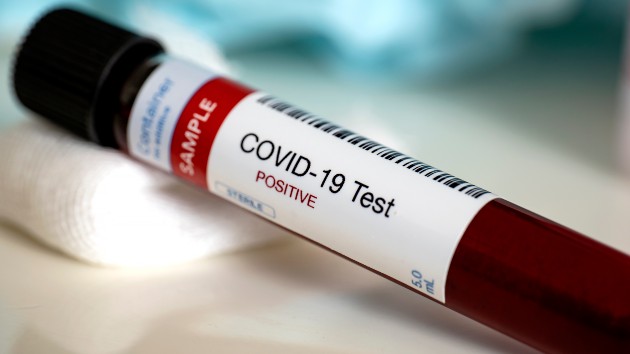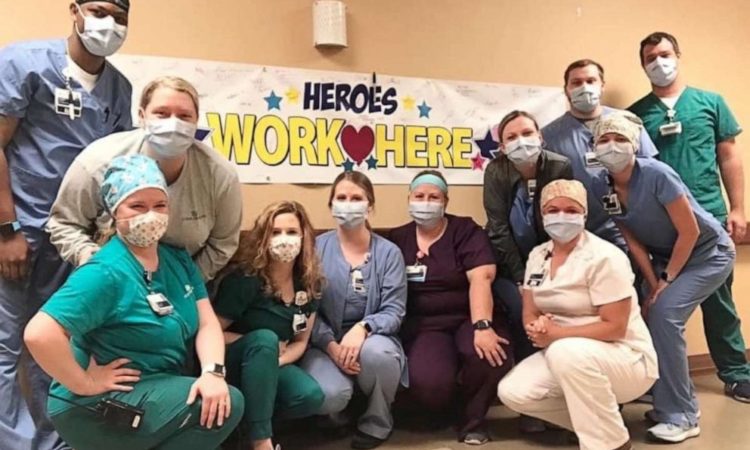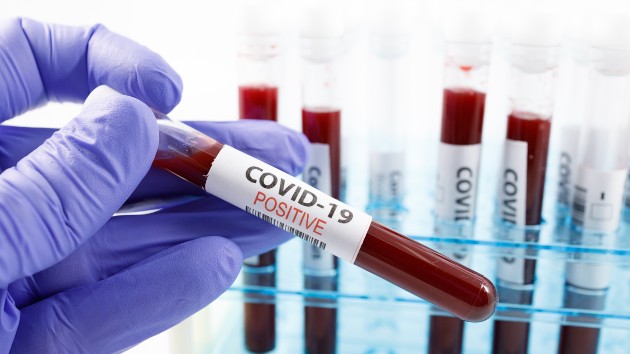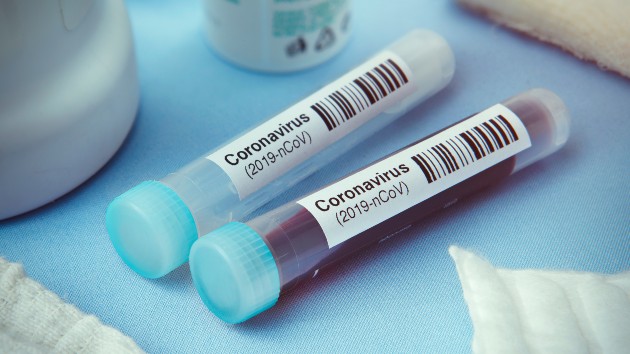 Myriam Borzee/iStockBy MORGAN WINSOR, ERIN SCHUMAKER, EMILY SHAPIRO and IVAN PEREIRA, ABC News
Myriam Borzee/iStockBy MORGAN WINSOR, ERIN SCHUMAKER, EMILY SHAPIRO and IVAN PEREIRA, ABC News
(NEW YORK) — A pandemic of the novel coronavirus has now infected more than 100.7 million people worldwide and killed over 2.1 million of them, according to real-time data compiled by the Center for Systems Science and Engineering at Johns Hopkins University.
Here’s how the news is developing Thursday. All times Eastern:
Jan 28, 9:36 am
847,000 US workers filed for unemployment insurance last week
Two pieces of economic data released Thursday highlight the pain of the U.S. economy as the coronavirus pandemic rages on.
Some 847,000 people nationwide lost their jobs and filed for unemployment insurance last week, according to the U.S. Department of Labor. That’s a decrease of 67,000 compared to the previous week’s figure.
In addition, the Department of Labor said more than 18 million people were still claiming some form of unemployment benefits through all U.S. government programs as of the week ending Jan. 9. For the comparable week last year, that number was approximately two million.
While the weekly unemployment filings figure has dropped off significantly since peaking at some 6.9 million in a single week last spring, they still remain at historically high levels.
Meanwhile, the U.S. Department of Commerce said Thursday that U.S. gross domestic product grew at a 4% annualized rate last quarter — a significant slowdown compared to the previous quarter, which saw an increase of 33.4% on an annualized basis. The third quarter’s huge spike, however, reflected businesses reopening after mass shutdowns.
Jan 28, 9:20 am
Americans can expect to see ‘escalation’ of vaccine availability, Fauci says
Dr. Anthony Fauci, chief medical adviser to U.S. President Joe Biden and the nation’s leading infectious disease expert, said Americans can expect to see more COVID-19 vaccine doses available throughout the country in the coming weeks.
“As we get into February, March and April, we’re going to see an escalation of availability of doses that we may have not had a week or two or three ago,” Fauci, who is also the director of the National Institute of Allergy and Infectious Diseases, told ABC News chief anchor George Stephanopoulos in an interview Thursday on Good Morning America.
Although COVID-19 data is starting to show some promising trends, Fauci said the U.S. outbreak is “still a very serious situation.”
“If you look throughout the country, the dynamics of the outbreak are a little bit unstable,” he noted, “even though for the most part we’re seeing general trends, seven-day trends of cases going down and ultimately, hopefully, hospitalizations and deaths.”
When asked about reopening schools safely, Fauci said COVID-19 transmission rates in schools actually appear to be less than in communities when the schools have the resources and protection they need.
“So if you have a situation where you have dynamics of a viral spread in a community, it’s less likely that the children who are in the school — if we do things right, it’s less likely that they’re going to get infected,” he said. “Obviously we want to get the teachers vaccinated, we want to make sure they have the resources to do it correctly. But when you look at the history of how this virus is moving in schools, it seems to be less spreading there than it is in the community.”
Fauci also expressed concern over the new, more contagious variant of the novel coronavirus that was first identified in South Africa and has since spread to dozens of other nations, including the United States.
“The one in South Africa, George, troubles me,” he said, explaining that lab experiments show the neutralizing antibodies induced by existing COVID-19 vaccines are “diminished by multifold” when tested against the South Africa variant, called 501Y.V2.
“It’s still within the range of what you would predict to be protective,” he added, “but I take no great comfort in that.”
However, scientists are already working on vaccines that will specifically target the South Africa strain, according to Fauci.
“May not be necessary,” he said, “but if it is we’ll already be on the road to be able to give people a boost that directs against the South African isolate.”
Jan 28, 8:13 am
COVID-19 vaccinations won’t be a prerequisite at Tokyo Olympics, organizers say
Being vaccinated against COVID-19 will not be a requirement to compete in the upcoming Tokyo Olympics, organizers said Thursday.
The 2020 Summer Olympics were supposed to kick off in the Japanese capital last year on July 24. But in late March, amid mounting calls to delay or cancel the upcoming Games, the International Olympic Committee (IOC) and Japan’s prime minister announced that the event would be held a year later due to the coronavirus pandemic.
The Games are now scheduled to open in Tokyo this summer on July 23, but doubt has surfaced as Japan — and much of the world — grapples with a resurgence of COVID-19 infections. Moreover, Japan is not expected to begin administering its first round of COVID-19 vaccinations until the end of February.
During a press briefing Thursday following a call with the IOC’s president, organizers were asked how Japan will safely host the Olympics as scheduled when the country’s mass vaccination campaign is not expected to inoculate most of the population by that date.
“Since last year, we have been having thorough debates and discussions on that topic. We do not consider the vaccine as a prerequisite,” Toshiro Muto, chief executive officer of the Tokyo 2020 organizing committee, told reporters. “Of course, it’s desirable to have as many people as possible vaccinated, and that would bring about positive benefit. But even if vaccination is not done, we will be able to hold the Games.”
Muto added that COVID-19 vaccinations would be administered to athletes but it wouldn’t be an obligation.
As for vaccinating staff and volunteers, Muto said that decision will be made at the national government level.
Yoshiro Mori, president of the Tokyo 2020 organizing committee, said they are still considering holding the Games without spectators.
“One option among many would be to hold the games without spectators,” he told reporters. “We don’t want to do this but we must take this scenario into consideration.”
With less than six months left until the opening day, a recent poll by Japanese news agency Kyodo found that around 80% of people in Japan believe the Tokyo Olympics should not be held this summer. When asked by ABC News about that opinion, Mori said: “There is a balance. On one hand there is criticism, the other hand is support.”
Mori noted that the IOC’s president has “strongly backed up our efforts” to hold the Tokyo Olympics as planned.
“Nowhere did we hear objections or doubt,” he told reporters. “Everyone wants to successful hold the games.”
Jan 28, 6:32 am
UK prime minister hints that England’s lockdown won’t end before March 8
British Prime Minister Boris Johnson has indicated that England’s lockdown restrictions will remain in place until at least early March.
In a statement to lawmakers at the U.K. House of Commons on Wednesday, Johnson said officials “do not yet have enough data to know exactly how soon it will be safe to reopen our society and economy.” But he expressed hope that schools could reopen from March 8, so long as his government meets its target of vaccinating everyone in the top four priority groups by mid-February.
The prime minister also announced new restrictions for travelers arriving in England from countries deemed to be high-risk. He said the United Kingdom remains in a “perilous situation” with more than 37,000 people hospitalized with COVID-19 — almost double the amount during the previous peak in April.
During a press conference later Wednesday, Johnson told reporters that March 8 was the “earliest” date by which the government could “responsibly” allow schoolchildren to return to classrooms.
The comments come after the U.K. became the fifth country in the world to record more than 100,000 deaths from COVID-19.
England entered its third national lockdown of the coronavirus pandemic on Jan. 5.
Although Johnson is the prime minister of the U.K., his administration is only responsible for COVID-19 restrictions in England because public health legislation is devolved to national governments within the U.K., meaning that Scotland, Wales and Northern Ireland are responsible for their own coronavirus-related policies.
Jan 28, 6:06 am
Alabama detects first cases of UK variant
A new, more contagious variant of the novel coronavirus first identified in the United Kingdom has been detected in Alabama for the first time.
The Alabama Department of Public Health announced Wednesday that two cases of the variant were confirmed in Montgomery County residents and a third in a Jefferson County resident. Two of the patients are children under the age of 19.
“These are the first reported cases in Alabama of the variant which was first detected in the United Kingdom in late 2020,” the department said in a statement. “This variant is associated with increased person-to-person transmission of COVID-19. ADPH is closely monitoring the emergence of this variant which has been detected in at least 24 other states.”
The so-called B117 variant, which is believed to have emerged in England in September, has been detected in more than two dozen U.S. states.
Jan 28, 5:29 am
CDC projects up to 514K virus deaths in US by Feb. 20
The U.S. Centers for Disease Control and Prevention now projects that the country will have recorded up to 514,000 COVID-19 deaths by Feb. 20.
The CDC on Wednesday published its latest national ensemble forecast, which predicts that the country’s COVID-19 death rate will likely decrease over the next four weeks and that 13,500 to 25,000 new fatalities from the disease will likely be reported in the week ending Feb. 20. A total of 479,000 to 514,000 COVID-19 deaths are projected to be reported nationwide by this date.
Last week’s national ensemble forecast predicted there would be a total of 465,000 to 508,000 COVID-19 deaths reported nationwide by Feb. 13.
Jan 28, 5:18 am
US has detected 315 cases of UK variant so far, CDC data shows
The United States has detected at least 315 confirmed cases of the highly contagious variant of the novel coronavirus that first emerged in the United Kingdom, according to the latest data from the Centers for Disease Control and Prevention.
California and Florida are tied at 92 cases each for the U.S. state with the most confirmed cases of the so-called B117 variant, according to CDC data.
The variant was first identified in England in September and has since spread to dozens of other countries around the world.
Jan 28, 4:06 am
WHO team completes quarantine for pandemic probe in Wuhan, China
A World Health Organization team emerged from their 14-day quarantine in the Chinese city of Wuhan on Thursday to begin field work in their investigation of the origins of the virus that cause the COVID-19 pandemic.
China’s COVID-19 regulations required all members of the team to complete 14 days of quarantine upon their arrival. They have been taking part in virtual meetings during the quarantine period.
The researchers were seen leaving their hotel and boarding a bus on Thursday afternoon.
Jan 28, 3:49 am
US reports over 152,000 new cases
There were 152,478 new cases of COVID-19 confirmed in the United States on Wednesday, according to a real-time count kept by Johns Hopkins University.
Wednesday’s case count is far less than the country’s all-time high of 300,282 newly confirmed infections on Jan. 2, Johns Hopkins data shows.
An additional 3,943 fatalities from COVID-19 were registered nationwide on Wednesday, down from a peak of 4,466 new deaths on Jan. 12, according to Johns Hopkins data.
COVID-19 data may be skewed due to possible lags in reporting over the Martin Luther King Jr. Day holiday weekend.
A total of 25,598,062 people in the U.S. have been diagnosed with COVID-19 since the pandemic began, and at least 429,195 have died, according to Johns Hopkins data. The cases include people from all 50 U.S. states, Washington, D.C., and other U.S. territories as well as repatriated citizens.
Much of the country was under lockdown by the end of March as the first wave of the pandemic hit. By May 20, all U.S. states had begun lifting stay-at-home orders and other restrictions put in place to curb the spread of the novel coronavirus. The day-to-day increase in the country’s cases then hovered around 20,000 for a couple of weeks before shooting back up over the summer.
The numbers lingered around 40,000 to 50,000 from mid-August through early October before surging again to record levels, crossing 100,000 for the first time on Nov. 4, then reaching 200,000 on Nov. 27 before topping 300,000 on Jan. 2.
So far, the U.S. Food and Drug Administration has authorized two COVID-19 vaccines for emergency use — one developed by U.S. pharmaceutical giant Pfizer and its German partner BioNTech, and another developed by American biotechnology company Moderna and the National Institute of Allergy and Infectious Diseases.
Copyright © 2021, ABC Audio. All rights reserved.










